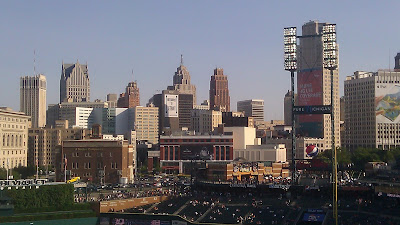Prayers for Detroit
Thursday
afternoon Kevyn Orr, the emergency manager of Detroit, filed in Federal for
Chapter Nine bankruptcy protection. Orr
did so operating under the authority granted to him by Governor Rick
Snyder. Under current state law the
emergency manager has sweeping powers to restructure contracts and government
services. The EM also has the authority
to file for bankruptcy protection. It
may be unpopular and even unfair, but few are surprised by this turn of
events. The future of Detroit, one of
America’s great cities, is uncertain.
The future is uncertain, but I remain hopeful that in the end Detroit
will experience resurrection.
I write
this post from the perspective of the neighbor.
I’m not a Detroiter. Although I
go into the city fairly regularly, I live in the suburbs. I go to watch baseball games, take in
concerts, and enjoy other aspects of Detroit’s cultural life. But I always return home to the relative
affluence of my suburban community. My
involvement with Detroit does go beyond its cultural life. I’m involved with several ministries that are rooted
in Detroit, ministries that in their own way seek to build bridges between the
city and those who live outside its boundaries.
Although I’ve not lived long in the area – just five years – I have come
to believe that city and suburb need each other. One of the reasons why I’ve thought a lot
about this is that the church I pastor once lived on Woodward Avenue in Detroit. We were once one of the churches that existed
along what was then known as Piety Row.
Like many predominantly white churches in Detroit, Central Woodward
Christian Church, moved to the suburbs. The
church stayed well into the 1970s, but with a membership living largely in the
suburbs and with a cathedral-like building it could no longer maintain, the
leadership decided it was time for a fresh start. I’ve never lived or served the church as
pastor in the city of Detroit, but there is a connection that draws my heart and my
prayers.
Like
many inside and outside the city, I’m concerned about the city’s future. I know that its debt is overwhelming. Successive governments made promises that it
no longer has assets to fulfill. Its tax-base has grown ever smaller, even as
the land mass that makes up the city has remained the same as it did when 1.6
million people made Detroit their home. Bankruptcy suggests that things have come to a
tipping point, but with the bad news there is also good news. There are signs of hope – green shoots of
investment and blight removal. Jobs are
returning, at least to some areas of the city.
And yet, the city still stands on the edge.
From my
reading and my conversations, I’ve learned that city and suburb have long lived
as if the other didn’t exist. One side
of the line is predominantly African American, and the other predominantly
Caucasian – (though the suburbs are becoming much more diverse in recent
decades). What I’ve learned is that city and suburb
can’t survive any longer as if the other doesn’t exist. We are in this together. If Detroit and the metro area are to survive
we’ll have to work together. With this
in mind consider the discussion over a Regional Transit Authority. This discussion has given us the opportunity
to explore the urban/suburban relationship.
We are one of the few major cities without a functioning transit system
linking suburb and city. If we’re to
grow, we’ll need to build this transportation network.
If you
think that the suburbs can survive without the city, let me point to a helpful
analogy that is apropos to this region.
Remember how Ford Motor Company got a lot of good press because it
didn’t take or need Federal support, unlike GM and Chrysler? It
helped Ford’s sales, but Ford supported the help given to its competitors
because they knew that if GM and Chrysler went under, they likely would follow
suit. You see, they share
suppliers. If the other two companies
went under, the suppliers likely would as well, and Ford would have been in
trouble. Fortunately, that’s not the way
it turned out.
You may
not live in the city of Detroit, but if you live in its suburbs, or elsewhere
in the state, it’s important to note that everyone benefits from a strong
Detroit.
I will
admit to be conflicted about the Emergency Manager Law. I’m conflicted because I can see that the
citizens of Detroit have lost a lot of self-determination. I understand the concern felt by those in
danger of losing pension benefits. The
way forward is going to be difficult, and I can only try to understand the
concerns of those involved. But, I’m
fairly certain that bankruptcy will proceed.
Therefore, I will pray that a good outcome will emerge for Detroit.
I hope you will join me in praying
for our neighbors in Detroit. As Jesus
reminds us, God has called on us to do two things – love God and love our
neighbor. Let us do both by doing what
we can to help our neighbors in Detroit regain their self-determination, along
with a new future free from an overwhelming financial debt. Yes, let us pray for good things to come upon
the people of the city of Detroit.
As you pray, perhaps the words of this Erik Routley hymn can provide
guidance:
All who love and serve the city, all who bear its daily stress,
All who cry for peace and justice, all who curse and all who bless:
Risen Lord! Shall yet the city be
the city of despair?
Come today, our Joy, our Glory: Be its name, “The Lord is there.”


Comments